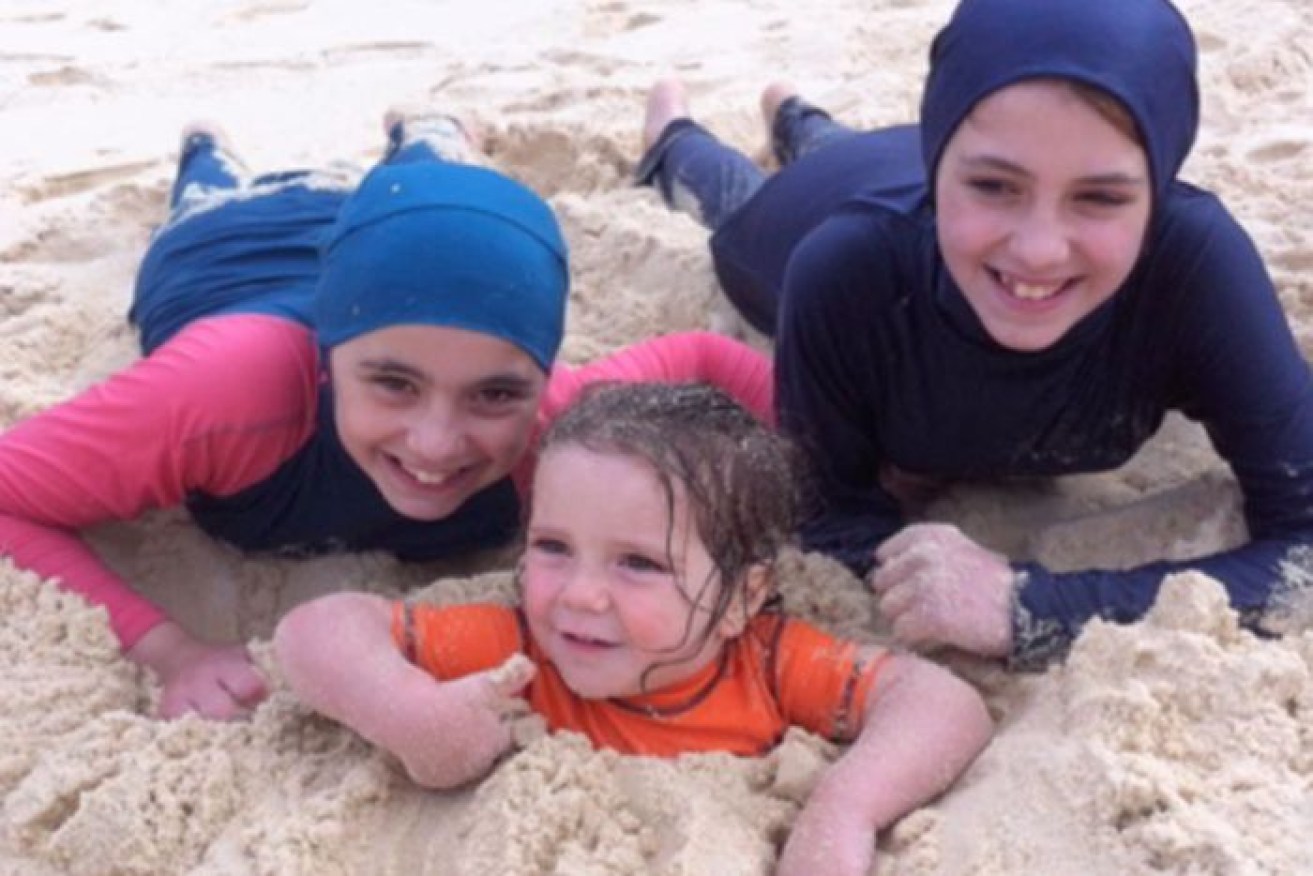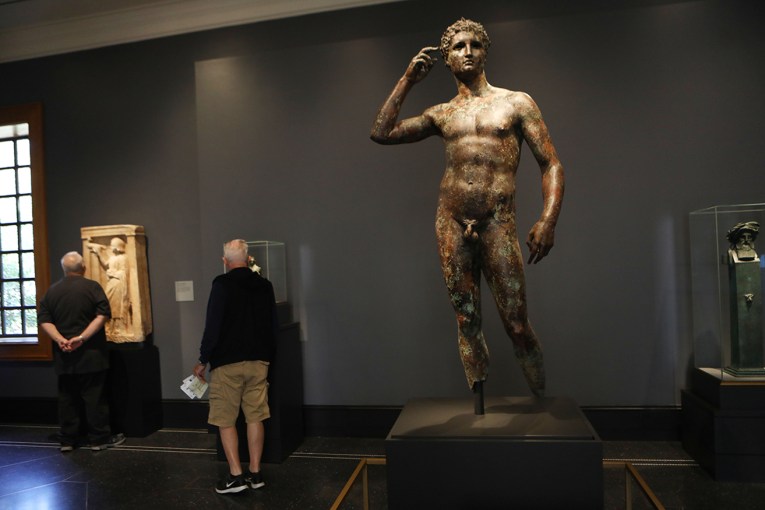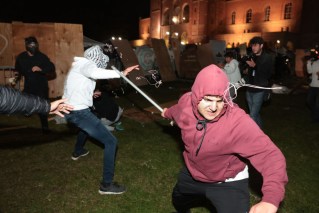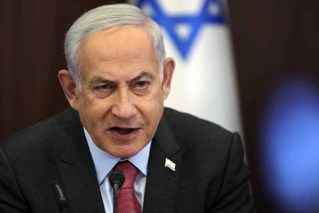Sharrouf children among Australian orphans freed from Syria in secret rescue mission

Hoda, Humzeh and Zaynab Sharrouf at the beach in Australia before their parents took them to Syria. Photo: Supplied/ABC
The orphaned Australian children of Islamic State fighter Khaled Sharrouf are among eight rescued from a Syrian refugee camp and taken to a nearby Middle Eastern country, en route to a new life in Australia.
Zaynab Sharrouf, 18, and her 17-year-old sister Hoda and eight year-old brother Humzeh were taken from Syria by an aid agency working in concert with the Australian Government.
With them are Zaynab’s two toddlers, Aiyesha, 3, and Fatimah, 2. Zaynab is also heavily pregnant with her third child.
Also removed from Syria in the same convoy were the three young Australian children of slain Islamic state fighter from Melbourne, Yasin Rizvic.
The eight children crossed the Syrian border about 5:45pm on Sunday, Australian time, and arrived at a nearby city several hours later, where they were expected to be reunited with their maternal grandmother, Karen Nettleton.
Ms Nettleton has spent half a decade trying to free her grandchildren from the Syrian warzone.
The ABC is withholding the children’s location due to concerns for their safety.
Prime Minister confirms rescue
Prime Minister Scott Morrison released a statement soon after the children crossed the border.
“There has been welcome news today from the bleak and complicated situation in Syria with several Australian children being repatriated from the conflict zone into the care of Australian Government officials,” he said.
“The fact that parents put their children into harm’s way by taking them into a war zone was a despicable act.
“However, children should not be punished for the crimes of their parents.
“Repatriating these children was not a decision the Australian Government made lightly. As I have said repeatedly, my government would not allow any Australian to be put at risk.
“Australia’s national security and the safety of our people and personnel have always been our most important considerations in this matter.
“Australian authorities will consider the welfare and support needs of each child before returning to Australia.
“I would like to thank the Department of Foreign Affairs and Trade officials for their outstanding work in these unique and extraordinarily difficult circumstances as well as the support and efforts of Australia’s partners.”

Zaynab, Karen Nettleton, Hoda, Humzeh and Zaynab’s daughters Fatimah and Aiyesha.
Photo: David Maguire
Zaynab turned 18 on Saturday and Hoda turned 17 on Sunday, the same day the children crossed the border. Neither they nor Ms Nettleton could not be contacted for comment.
It is likely the orphans will require significant medical treatment now they are free from Syria.
Hoda Sharrouf is lame after being shot 18 months ago and Zaynab Sharrouf is only days away from giving birth to her third child.
A history of violence
The Sharrouf orphans were taken to Syria and IS by their mother and Sharrouf’s wife, Tara Nettleton, in February 2014.
She was following her husband Khaled Sharrouf, who left Australia several months earlier on his brother’s passport.
What followed for the children was five years of violence and deprivation.

Khaled Sharrouf is believed to have been killed by a coalition air strike while driving near Raqqa in Syria. Photo: Supplied/ABC
The two eldest Sharrouf boys, Abdullah and Zarqawi, began attending IS training camps, and family photos showed them posing with guns.
Not long after they arrived, Khaled Sharrouf arranged for Zaynab, then 13, to marry his friend and fellow Australian fighter Mohamed Elomar. The pair had one child, Aiyesha.
Zaynab later had another child, Fatimah, to another friend of her father’s to whom she was, again, married.
Since then the Sharrouf children have endured the deaths of almost everyone around them.
Their mother Tara died of health complications in Mosul, Iraq, in mid 2015. Elomar was killed in an airstrike soon after Nettleton’s death.
The children returned to Raqqa, Syria, with their father where they remained until August 2017, when Sharrouf, Abdullah and Zarqawi, were killed in a US airstrike near Raqqa.
“We were brought here by our parents”
Since being orphaned the surviving Sharrouf children have been cared for by a pair of IS converts: Zaynab’s Lebanese-born second husband and a Moroccan-born wife taken by Sharrouf before his death.
The children left Zaynab’s husband behind when they fled IS’s last Syrian redoubt, Baghouz, in March.
Between March and yesterday the Sharroufs were held at a series of detention camps in Kurdish-controlled north eastern Syria.
It was in March in the first of those camps, al-Hawl, that the children were reunited with Ms Nettleton after five years.
At the time Zaynab told the ABC they were desperate to return to Australia and had wanted to flee IS for a long time but were too scared.
“People leave and no-one hears anything from them anymore,” she said.
She said they did not know they were going to Syria in 2014.
“We weren’t the ones that chose to come here in the first place. We were brought here by our parents,” Zaynab said.
Zaynab also told the ABC she and her siblings posed no risk if they returned to Australia.
“For me and my children, I want to live a normal life just like anyone would want to live a normal life,” she said.
“Don’t I have the right to live a normal life?”

Khaled Sharrouf’s children Zaynab (pink scarf), Hoda (black scarf), Abdullah (centre, deceased) and Humzeh (front). Photo: Supplied/ABC
Hoda said the past five years had been terrifying.
“When my Mum told me we were in Syria I started crying. I asked to go home every five seconds,” she said.
“I thought we could get out whenever we wanted to but you can’t. Once you get in, you’re stuck.”
Somewhere between 3,700 and 4,600 foreign children were taken to Syria to join IS — representing about 10 per cent of all foreigners — and a further 730 were born there to foreign parents, according to the UK-based International Centre for the Study of Radicalisation.
Save the Children estimates that more than 3,500 of those foreign children now languish in the three refugee camps in Syria’s north-east.
More than a hundred children have died from malnutrition, disease and exposure since being moved to the camps.

The ABC visited al-Hawl, the largest of the refugee camps, in March of this year. Photo: David Maguire








